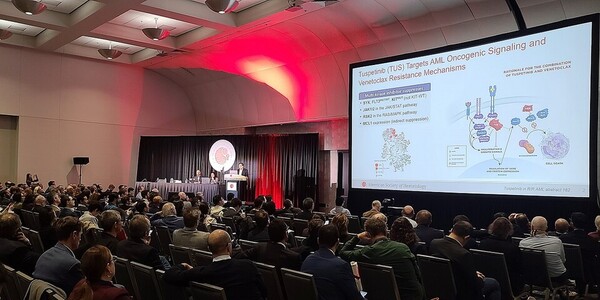Clinical data of tuspetinib, a new drug for acute myeloid leukemia (AML) developed by Hanmi Pharm, has been released at the annual meeting of the American Society of Hematology (ASH 2023), drawing keen attention.

Hanmi Pharm said its partner company Aptose Biosciences presented oral clinical data on tuspetinib at the ASH 2023 in San Diego, Calif., on Saturday. The presentation was given by Dr. Naval G. Daver, professor of leukemia at MD Anderson Cancer Center.
Aptose announced that a phase 1/2 clinical trial (APTIVATE) in patients with relapsed or refractory AML confirmed a significant therapeutic benefit of tuspetinib alone or in combination with venetoclax (Vencrexta in brand name) co-developed by AbbVie and Genentech.
According to Hanmi and Aptose, complete remission (CR) occurred in 29 percent (eight of 28) of patients not previously treated with venecoclax in the 80 mg-160 mg tuspetinib monotherapy study in 68 patients.
They included FLT3-mutated patients with a 42 percent (five of 12) CR rate and wild-type or FLT3-mutated (unmutated) patients with a 19 percent (three of 16) CR rate.
Tuspetinib had a favorable safety profile with only mild adverse events (AEs) up to 160 mg per day, no dose-limiting toxicities (DLTs), and no discontinuations due to drug-related toxicities. Tuspetinib 80 mg was selected as the recommended dose for the upcoming phase 2 study.
In the tuspetinib/venetoclax (80 mg/200 mg) combination arm, 49 patients were dosed, of which 36 were assessable. Most of these patients had received prior VEN or FLT3 inhibitor therapy.
The tuspetinib/venetoclax combination demonstrated good efficacy, with a CR rate of 25 percent (nine of 36) in previously untreated patients and patients with relapsed or refractory venetoclax.
CR rates of 43 percent (three of seven) in patients without experiencing venetocrax treatment and 21 percent (six of 29) in treatment-experienced patients were observed, with CR rates of 20 percent (five of 25) in FLT3 unmutated patients and 36 percent (four of 11) in FLT3-mutated patients.
"Tuspetinib has shown clear therapeutic benefit in relapsed or refractory AML, a very difficult and challenging disease to treat, and is remarkably well tolerated," Dr. Daver said. "It is effective in a wide range of patient populations, including FLT3 unmutated-type and FLT3- and NPM1-mutant patients, which account for more than 70 percent of AML patients."
From a broader perspective, the safety profile of tuspetinib, coupled with its increasingly broad spectrum of antileukemic activity, provides important evidence to support the potential for a three-drug regimen, including a hypomethylating agent, to be used as a first-line treatment for new AML patients in the future, Dr. Daver explained.
Dr. Rafael Bejar, chief medical officer of Aptose, said, "These data suggest that tuspetinib is a highly active and differentiated drug for AML patients who need options beyond currently available therapies. “We look forward to reporting the next data set in the first quarter of 2024."
Related articles
- [ASH 2023] Korean researchers suggest a drug-less future for CML patients
- [ASH 2023] Blood disorder innovators highlight latest progress at US meet
- [ASH 2023] Epcoritamab and lenalidomide show promising results in challenging DLBCL cases
- [ASH 2023] New combo therapy for rare lymphoma shows encouraging outcomes

